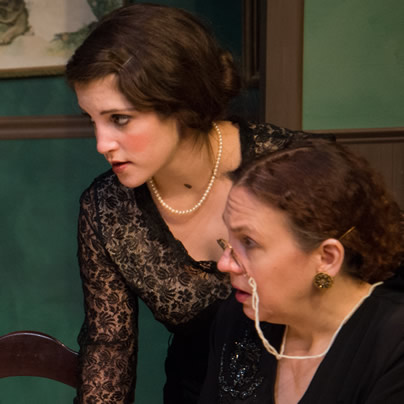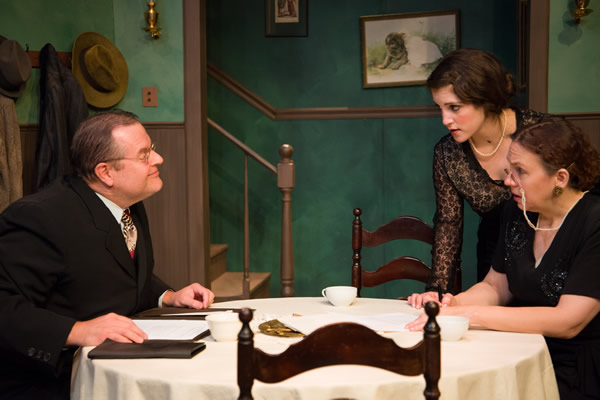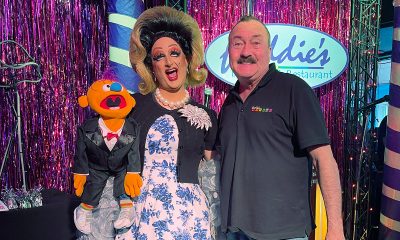Arts & Entertainment
Gem from another era
Philly-set 1924 drawing room comedy ‘The Show Off’ gets delightful revival

‘The Show-Off’
Through Feb. 2
American Century Theater
Gunston Performing Arts Center, Theatre II
2700 South Lang Street, Arlington
$35-$40
703-998-4555
americancenturytheatre.org

From left, Joe Cronin, Jenna Berk and Lee Mikeska Gardner in ‘The Show-Off.’ (Photo by Johannes Markus; courtesy of the American Century Theater)
Everyone’s met an Aubrey Piper, the obnoxious title character in George Kelly’s 1924 comedy “The Show-Off.” Loud, boastful, desperate for attention, Aubrey is a nightmare in an obvious toupee and a liar to boot. But lucky for most of us, unlike the Fishers, the good folks featured in Kelly’s play, we don’t have an Aubrey marrying into the family.
At 90, Kelly’s play is windy but fundamentally funny precisely because it deals in familiar, time-resistant types. “The Show-off” got its start as a big Broadway hit and subsequently enjoyed revivals and was adapted to the screen more than once. Currently, it’s in production at Arlington’s American Century Theater, a company committed to promoting 20th century plays as a vital part of today’s cultural dialogue.
The show opens with Mrs. Fisher (Lee Mikeska Gardner) dishing the dirt with her sensible, well-married daughter Clara (Jenna Berk). It seems Aubrey (David Gram) has been coming to call on the Fishers’ younger daughter Amy (Erin E. McGuff) every Wednesday and Sunday evening without fail. Not content to woo his giggly girlfriend privately in the offstage parlor, Aubrey brings his corny jokes, tall tales and off key singing center stage to the living room where Amy’s parents and her inventor brother Joe (Evan Crump) are trying to pass a quiet evening at home. A solid working class family with a comfortable house in northern Philadelphia, the Fishers can’t understand what their daughter sees in the phony low paid freight clerk posing as a Pennsylvania Railroad big shot.
By act two the Fishers’ worst fears are realized: Aubrey and Amy are married. By act three, it gets even worse, and finally a little better. At the end, Clara begins to soften. Locked in a lonely marriage, she is charmed by Aubrey’s sincere love for her sister. And though he doesn’t pull a big salary, Aubrey does go to work every day. In the end, despite — or more likely because of — his borderline con artist ways, Aubrey brings a boon to the family. Will he again in the future? That’s unclear.
Set in the playwright George Kelly’s native Philadelphia, the comedy is filled with references to streets and neighborhoods including the downtown area where Clara’s detached husband Frank (Nello DeBlasio) first spotted Aubrey (he’s hard to miss with jaunty fedora, walking stick and red carnation), and the busy intersection where Aubrey runs down a cop.
George Kelly was enormously popular in the ‘20s and early ‘30s. Today, aside from being movie star Grace Kelly’s uncle, he is best known for “The Show-Off” and his Pulitzer Prize-winning drama “Craig’s Wife,” a morality tale about a controlling woman who values a pristine home above family and friendship. (The latter was adapted for the screen in ‘50s as “Harriett Craig,” a juicy mid-career vehicle for none other than real life clean freak Joan Crawford). Kelly was also gay, and not surprising for the time, carefully closeted. He maintained a 55-year relationship with partner William Weagley.
Uniformed in her apron and rolled down hose, Mikeska Gardner’s Mrs. Fisher is a feisty but warmhearted and uncomplicated homemaker. Sometimes she plays her a bit simple but never a fool. Similarly, Gram’s Aubrey even at his most over-the-top, third rate vaudevillian weirdness, is no fool either. It’s a good thing too. The play wouldn’t work otherwise.
Ably directed by Stephen Jarrett, the talented nine-person cast is especially cohesive. Set designer Leigh-Ann Friedel’s living room is handsome and realistic, well suited to Kelly’s durable play. (Kelly had no time for the modernism and more experimental theater forms en vogue in his heyday). Showing great attention to detail, Erin Nugent successfully clothes the cast through numerous costume changes on a presumably not huge budget.
Once again, The American Century Theater has fulfilled its mission by plucking and mounting a charming seldom-produced show from the American repertoire. See it while you can.
Sports
Bisexual former umpire sues Major League Baseball for sexual harassment
Brandon Cooper claims female colleague sexually harassed him

A fired former umpire is suing Major League Baseball, claiming he was sexually harassed by a female umpire and discriminated against because of his gender and his sexual orientation.
Brandon Cooper worked in the minor league Arizona Complex League last year, and according to the lawsuit he filed Wednesday in federal court in Manhattan, he identifies as bisexual.
“I wanted my umpiring and ability to speak for itself and not to be labeled as ‘Brandon Cooper the bisexual umpire,’” he told Outsports. “I didn’t want to be labeled as something. It has been a passion of mine to simply make it to the Major Leagues.”
But that didn’t happen. Instead of being promoted, he was fired. His suit names MLB and an affiliated entity, PDL Blue, Inc., and alleges he had endured a hostile work environment and wrongful termination and/or retaliation because of gender and sexual orientation under New York State and New York City law.
“Historically the MLB has had a homogenous roster of umpires working in both the minor and major leagues,” Cooper claims in his suit. “Specifically, to date there has never been a woman who has worked in a (regular) season game played in the majors, and most umpires are still Caucasian men. To try to fix its gender and racial diversity issue, defendants have implemented an illegal diversity quota requiring that women be promoted regardless of merit.”
Cooper claims former umpire Ed Rapuano, now an umpire evaluator, and Darren Spagnardi, an umpire development supervisor, told him in January 2023 that MLB had a hiring quota, requiring that at least two women be among 10 new hires.
According to the suit, Cooper was assigned to spring training last year and was notified by the senior manager of umpire administration, Dusty Dellinger, that even though he received a high rating in June from former big league umpire Jim Reynolds, now an umpire supervisor, that women and minority candidates had to be hired first.
Cooper claims that upon learning Cooper was bisexual, fellow umpire Gina Quartararo insulted him and fellow umpire Kevin Bruno by using homophobic slurs and crude remarks. At that time, Quartararo and Cooper worked on the same umpiring crew and being evaluated for possible promotion to the big leagues.
This season, Quartararo is working as an umpire in the Florida State League, one of nine women who are working as minor league umpires.
Cooper said he notified Dellinger, but instead of taking action against Quartararo, he said MLB ordered Cooper to undergo sensitivity training. According to his lawsuit, he was also accused of violating the minor league anti-discrimination and harassment policy.
Cooper’s suit says he met with MLB Senior Vice President of Diversity, Equity and Inclusion Billy Bean — who the Los Angeles Blade reported in December is battling cancer.
The lawsuit says at that meeting, Bean told the umpire that Quartararo claimed she was the victim, as the only female umpire in the ACL. Cooper said he told Bean Quartararo regularly used homophobic slurs and at one point physically shoved him. He also claims that he has video evidence, texts and emails to prove his claim.
But he said his complaints to Major League Baseball officials were ignored. His lawsuit said MLB passed him over for the playoffs and fired him in October. He said of the 26 umpires hired with Cooper, he was the only one let go.
Through a spokesperson, MLB declined to comment on pending litigation. Quartararo has also not publicly commented on the lawsuit.
a&e features
Eastern Shore chef named James Beard Finalist
Harley Peet creates inventive food in an inclusive space

In a small Eastern Shore town filled with boutiques, galleries, and the occasional cry of waterfowl from the Chesapeake, Chef Harley Peet is most at home. In his Viennese-inflected, Maryland-sourced fine-dining destination Bas Rouge, Peet draws from his Northern Michigan upbringing, Culinary Institute of America education, and identity as a gay man, for inspiration.
And recently, Peet was named a James Beard Finalist for Best Chef: Mid-Atlantic – the first “Best Chef: Mid-Atlantic” finalist representing the Eastern Shore.
Peet, after graduation from the Culinary Institute of America, took a position as sous chef at Tilghman Island Inn, not far from Bas Rouge. Falling in love with the Eastern Shore, he continued his passion for racing sailboats, boating, gardening, and fishing, and living his somewhat pastoral life as he opened Bas Rouge in 2016 as head chef, a restaurant part of the Bluepoint Hospitality group, which runs more than a dozen concepts in and around Easton, Md.
Coming from a rural area and being gay, Peet knew he had his work cut out for him. He was always aware that the service and hospitality industry “can be down and dirty and rough.”
Now as a leader in the kitchen, he aims to “set a good example, and treat people how I want to be treated. I also want to make sure if you’re at our establishment, I’m the first to stand up and say something.”
The Bas Rouge cuisine, he says, is Contemporary European. “I’m inspired by old-world techniques of countries like Austria, Germany, and France, but I love putting a new spin on classic dishes and finding innovative ways to incorporate the bounty of local Chesapeake ingredients.”
His proudest dish: the humble-yet-elevated Wiener Schnitzel. “It is authentic to what one would expect to find in Vienna, down to the Lingonberries.” From his in-house bakery, Peet dries and grinds the housemade Kaiser-Semmel bread to use as the breadcrumbs.
Peet works to support the LGBTQ community inside and outside of the kitchen. “I love that our Bluepoint Hospitality team has created welcoming spaces where our patrons feel comfortable dining at each of our establishments. Our staff have a genuine respect for one another and work together free of judgment.”
Representing Bluepoint, Peet has participated in events like Chefs for Equality with the Human Rights Campaign, advocating for LGBTQ rights.
At Bas Rouge, Peet brings together his passion for inclusion steeped in a sustainability ethic. He sees environmental stewardship as a way of life. Peet and his husband have lived and worked on their own organic farm for several years. Through research in Europe, he learned about international marine sourcing. Witnessing the impacts of overfishing, Peet considers his own role in promoting eco-friendly practices at Bas Rouge. To that end, he ensures responsible sourcing commitments through his purveyors, relationships that have helped create significant change in how people dine in Easton.
“I have built great relationships in the community and there’s nothing better than one of our long-standing purveyors stopping in with a cooler of fresh fish from the Chesapeake Bay. This goes especially for catching and plating the invasive blue catfish species, which helps control the species’ threat to the local ecosystem.
Through his kitchen exploits, Peet expressed a unique connection to another gay icon in a rural fine-dining restaurant: Patrick O’Connell, of three Michelin starred Inn at Little Washington. In fact, Peet’s husband helped design some of O’Connell’s kitchen spaces. They’ve both been able to navigate treacherous restaurant-industry waters, and have come out triumphant and celebrated. Of O’Connell, Peet says that he “sees [his restaurants] as canvas, all artistry, he sees this as every night is a show.” But at the same time, his “judgment-free space makes him a role model.”
Being in Easton itself is not without challenges. Sourcing is a challenge, having to either fly or ship in ingredients, whereas urban restaurants have the benefit of trucking, he says. The small town “is romantic and charming,” but logistics are difficult – one of the reasons that Peet ensures his team is diverse, building in different viewpoints, and also “making things a hell of a lot more fun.”
Reflecting on challenges and finding (and creating) space on the Eastern Shore, Peet confirmed how important it was to surround himself with people who set a good example, and “if you don’t like the way something is going … move on.”

Team DC, the umbrella organization for LGBTQ-friendly sports teams and leagues in the D.C. area, held its annual Night of Champions Awards Gala on Saturday, April 20 at the Hilton National Mall. The organization gave out scholarships to area LGBTQ student athletes as well as awards to the Different Drummers, Kelly Laczko of Duplex Diner, Stacy Smith of the Edmund Burke School, Bryan Frank of Triout, JC Adams of DCG Basketball and the DC Gay Flag Football League.
(Washington Blade photos by Michael Key)



















-

 State Department3 days ago
State Department3 days agoState Department releases annual human rights report
-

 Maryland4 days ago
Maryland4 days agoJoe Vogel campaign holds ‘Big Gay Canvass Kickoff’
-

 Politics3 days ago
Politics3 days agoSmithsonian staff concerned about future of LGBTQ programming amid GOP scrutiny
-

 District of Columbia21 hours ago
District of Columbia21 hours agoCatching up with the asexuals and aromantics of D.C.











